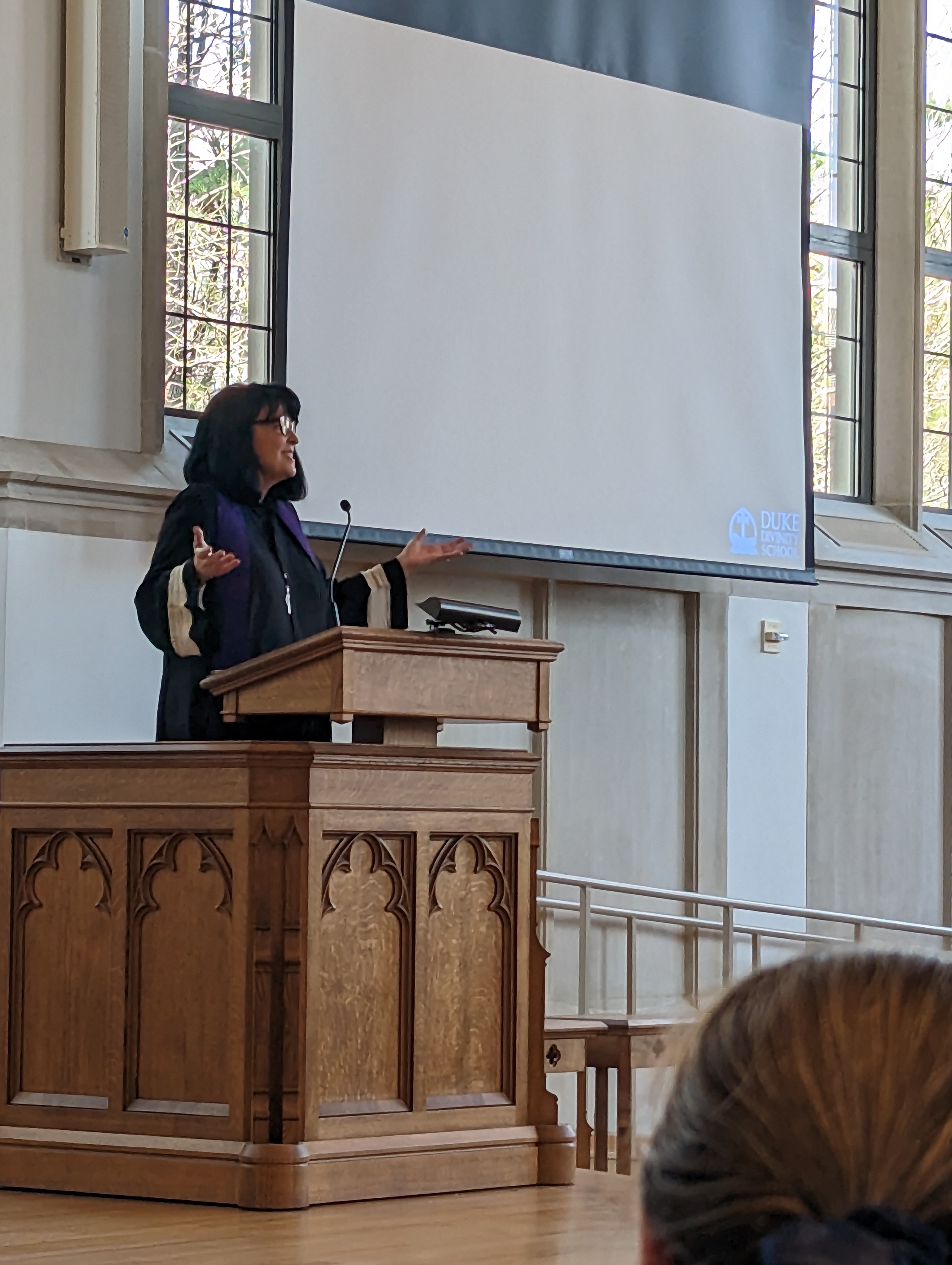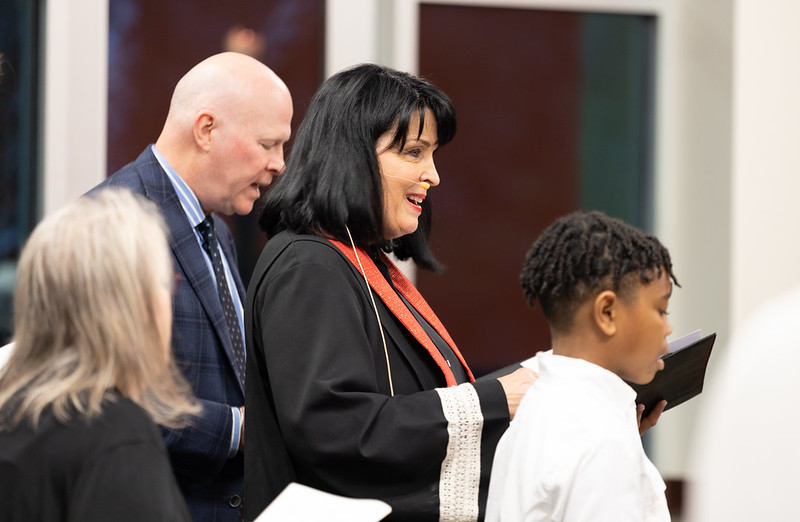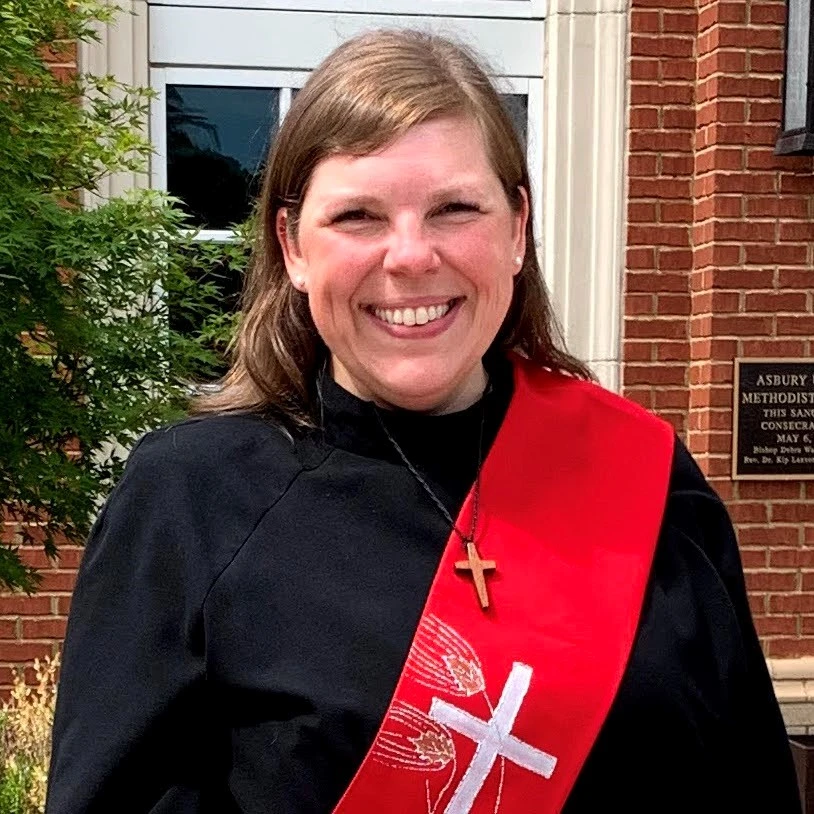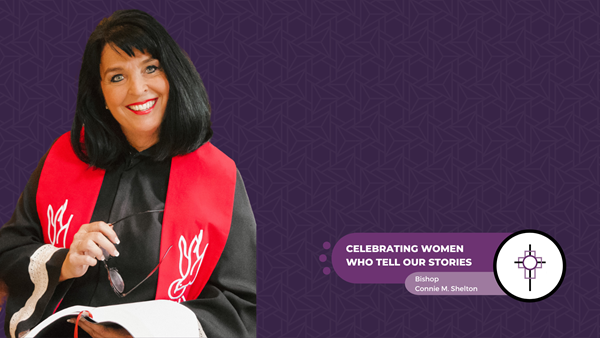There are two primary driving forces for Bishop Connie Shelton: being herself and keeping the rhythms that sustain her. Being herself is “incredibly liberating,” Shelton noted, commenting that she does not have to try harder if she just leans into her own being. Additionally, there is an hour every morning that grounds her work, where she shares coffee time with her long-time ministry partner and spouse, Joey, regardless of their location.

Bishop Shelton preaching at Duke Divinity School's Ash Wednesday service, 2023. Photo credit: Jay Locklear, NC Conference of The UMC.
Connie Shelton grew up in a different denomination, one that did not allow women in ministerial leadership. She started her ministry path in youth ministry, which she co-directed with her spouse. At one point in youth ministry, they both told the other that they felt called to ministry and to go to divinity school, much to the other person’s surprise. Yet, their collective callings confirmed their next step toward theological education. At Duke Divinity School, Shelton said that she captured her call as a clergywoman during her field education. Once graduated, she found plenty of new clergywomen friends (many from Duke) and received mentoring from several men who valued clergywomen and nominated her for opportunities. As she returned to Mississippi for ordination, she saw the moment as a beautiful expression of her goal to build relationships in ministry.
During her time in ministry in Mississippi, she had the chance to serve in conference ministry beyond the local church, both as a district superintendent (DS) and as the director of connectional ministries (DCM). During her time as a DCM, she engaged in a new conference structure that focused on disciple making and forwarding the trajectory of the church. As a DS, she loved to see the appointment process create transformation with thriving ministries and leaders. She saw her ministry as deeply founded in joy, but she also saw herself as a theological bungee jumper, tethered to God, but making huge leaps of faith.
In 2016, Shelton’s name appeared as a possible Episcopal candidate, but she eventually withdrew. Ironically, Robin Dease sat behind her and questioned who Shelton was after her name appeared on the ballot. The moment became the start of their friendship, and they were both elected in 2022 to the Council of Bishops.
As 2020 drew closer, she discerned to make herself available again for the Episcopacy. Two groups of people affirmed that move, the Southeast Jurisdictional Conference Clergywomen’s Convocation and the Mississippi Annual Conference. Shelton moved forward knowing that she was called to rebuild trust in the Church and to bring the gift of unity, both of which required her comprehensive work of relationship building. Episcopal elections in the Southeast Jurisdiction are often tense and difficult, and can be ridden with elements of hostility and pride. Shelton remembered that she managed to steer clear of the anxiety-ridden atmosphere that the SEJ often carries during elections.
In beginning her candidacy for bishop, Shelton leaned heavily into the practice of spiritual disciplines. She focused on building relationships with other women across the jurisdiction. Shelton committed herself to be authentic, not living into the expectations of others. She wanted to be known for who she was and how she would lead and not on the limited labels that might arise. As Mississippi’s first woman candidate for the episcopacy, she knew the path would be difficult. However, in the difficult journey, she also became the first woman bishop elected out of Mississippi, which is a significant accomplishment for the conference.
Shelton’s ability to lead in this fashion was built on the leadership models in Mississippi, where women have always led even if they were not in the spotlight. Shelton was the face and voice of the televised “United Methodist Hour” in the late 1990s, so she became a known commodity in Mississippi Methodism. Further, COSROW was an important part of the process, especially in giving district superintendents the resources they needed when dealing with complaints. Mississippi also was the residence of a female bishop, Hope Morgan Ward, during Shelton’s time in ministry.
 Bishop Shelton singing during the Episcopal Area's service celebrating her assignment. You can watch the full service here. Photo credit: Amanda Packer, NC Conference of The UMC.
Bishop Shelton singing during the Episcopal Area's service celebrating her assignment. You can watch the full service here. Photo credit: Amanda Packer, NC Conference of The UMC.Shelton identified one of her strengths for ministry was her communication skills, in which she could always convey her joy. She also projects a vision for unity and mission, one that is strategic and bi-focal, allowing her to discern appropriate next steps. Finally, she is authentic, building relationships, not out of strategy, but out of genuine interest in humanity.
As she leads in the North Carolina Conference, she has specific visions for how to promote women in leadership. She hopes to have conversations with young clergy and to understand women’s experiences. She wants to rebuild trust with the Board of Ordained Ministry and come to better resolutions in the complaint process. In North Carolina, the conference COSROW has done a lot of work on clergywomen’s parity, and she hopes to continue that significant work.
Bishop Shelton longs for The United Methodist Church to have a vision of co-creating and co-leading, one in which there is not a need to name labels or groups that have been excluded or wronged. She has high hopes to open itinerancy so that people are received for the gifts they bring, not just for a congregation’s preference.
Shelton sees a hierarchy that needs to be flattened and she hopes to make progress in doing so. One of the ways that she sought to flatten the hierarchy was to have immediate district meetings with North Carolina United Methodists instead of having a central installation. She feels as though she is more likely to live into the moment in this way. For Shelton, this move is incarnational, as she said, “God is doing what I cannot do myself.”
For this task of the episcopacy, Shelton is present and ready to grow with the Church.
GCSRW celebrates the election and consecration of Bishop Connie Shelton, for her assignment to the North Carolina Conference, and for the Mississippi Conference in promoting women in leadership. We pray for Bishop Shelton as she leads in bold, new ways in North Carolina and in the Council of Bishops, that she continues to build strong relationships across all intersections of the Church, and that women and men within realize the impact that they have on how the Church is formed and how the Church can grow into its own calling across the globe.
Related links:
https://www.mississippi-umc.org/newsdetail/mississippi-s-connie-shelton-elected-bishop-17113982
https://www.clarionledger.com/story/opinion/2022/11/20/new-methodist-bishop-up-for-task-in-leading-umc-through-church-rift/69650763007/
https://static1.squarespace.com/static/62b8773b0a6d6d4fa181ddd9/t/62f7bbc29fcf50074b1818a3/1660402626404/shelton+bio.pdf
https://vimeo.com/767367416

Rev. Emily Nelms Chastain is a PhD student at Boston University, where she focuses on 19th and 20th Century American Christian History and the intersectionality of faith and gender. She earned her B.A. in History at the University of Alabama at Birmingham in 2007 and graduated with an M.A. Religion and M.Div. in 2019 from Claremont School of Theology. She's an ordained United Methodist Deacon in the North Alabama Conference, and entered academia after serving for 9 years within the United Methodist Church where she worked in Connectional Ministries. Emily served as a reserve delegate to the 2016 General Conference and as a delegate for the 2016 Southeastern Jurisdictional Conference. She has served on the GCSRW board since 2016.

